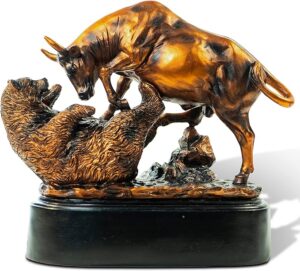
In many trading-related books, we often see the markets become associated with a jungle. And why not?
Every day, traders battle it out with animal references such as the bulls and the bears, the hawks and the doves, and the wolves and the sharks.
The markets can also be unpredictable, unforgiving, and dangerous. Surviving and conquering the markets requires knowledge, skills, and guts.
This is likely why traders love referencing themselves as modern-day hunters.
Some say that they’re like the cheetahs who catch their prey using sheer speed while others see themselves as crocodiles who lie in wait for a big, fat catch.
So what does it take to become a successful hunter? And for traders, what does it take to consistently make pips?
Let’s take a look at the fundamental steps that the best (animal and human) hunters take when they try to bring home the bacon:
1. Know your prey
When a lion wants to eat a buffalo, it doesn’t attack the first one it sees. It studies and analyses the herd’s behavior patterns and looks for its potential weaknesses.
By the time the lion is ready to strike, it already knows what makes the herd tick, where to attack, and how to get the fattest buffalo with the least amount of effort.
Like in the lion’s case, it’s essential for traders to collect data before striking.
Before you enter a EUR/USD short, for example, you must first know which factors can influence its price action and which levels present the best reward-to-risk ratios.
Ask yourself questions such as “Which economic reports does the pair usually respond to? When does the pair move the most? What factors can shift its current trend?”
Collect data and turn them into probabilities.
2. Wait for the best opportunity to strike
Once you’ve gathered information on your prey, use it to your advantage by striking at the best possible opportunity.
After all, hunters usually just get one chance. You don’t want to waste all that research catching the smallest prey, do you?
Maximize your gains while minimizing your effort and your risk.
The difference between an average and a skilled hunter is that the skilled hunter waits until the odds are overwhelmingly in his favor.
Don’t waste your chance by pouncing on the first possible trade. Be sensitive to the markets’ cues and wait for the trade with the best probabilities.
3. Execute according to plan
A crocodile doesn’t hesitate to jump out of the water when it’s time to catch the prey. It just executes the plan.
For traders, the time to think about what could happen and what you would do in an alternate scenario has passed. In this stage, it’s all about just doing what needs to be done.
Be quick, aggressive, accurate, and confident in your execution. Don’t let fear and greed get in the way of your performance.
Of course, it would help if you’ve already back and forward tested your trading strategy and if you’re confident that the numbers will add up in the end.
4. Monitor and adjust
At any given day a leopard could encounter an extraordinarily resilient gazelle or a similar scenario that could change the outcome of its attack.
Should the leopard use a different approach? Or should it abort its plan and wait for another opportunity?
As I said above, the markets can be fickle and unforgiving.
Just because AUD/USD has always had a bullish reaction to an RBA rate hike doesn’t guarantee that it will do so this month. If the actual trading scenario is different from the one you initially envisioned, then it’s time to make adjustments.
The first step is to consult your playbook for any alternative strategies you might have written or executed before. Then, weigh the outcomes of your options.
Should you cut your losses or let your profits run? Should you add to your position or close it and wait for another opportunity?
Whatever your decision is, remember to choose the path of minimum risk and maximum gains.
5. Learn and earn
The best hunters are the ones that have learned the most from their previous experiences. In the jungle, you eat what you kill. A predator would starve if it doesn’t smarten up with each kill.
As in the jungle, the consistently profitable traders are not the ones who have the most trades, but those who have learned from their experiences and continue to improve their skills with each trade.
One way to speed up your learning process is to engage in deliberate practice. The process of journaling, recording, and reviewing your trades turns one experience into many and makes it easier to correct your mistakes.
Surviving the forex jungle doesn’t require expensive tools or a fancy trading course.
Sometimes it just takes simple processes such as the one stated above, repeated day in and day out, to become slowly but consistently profitable.

